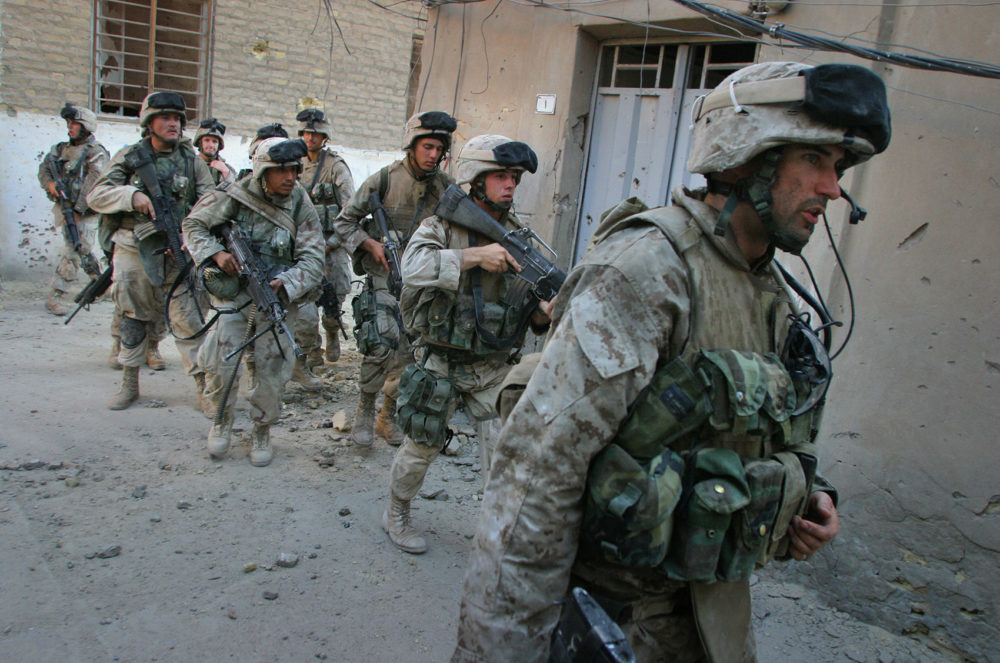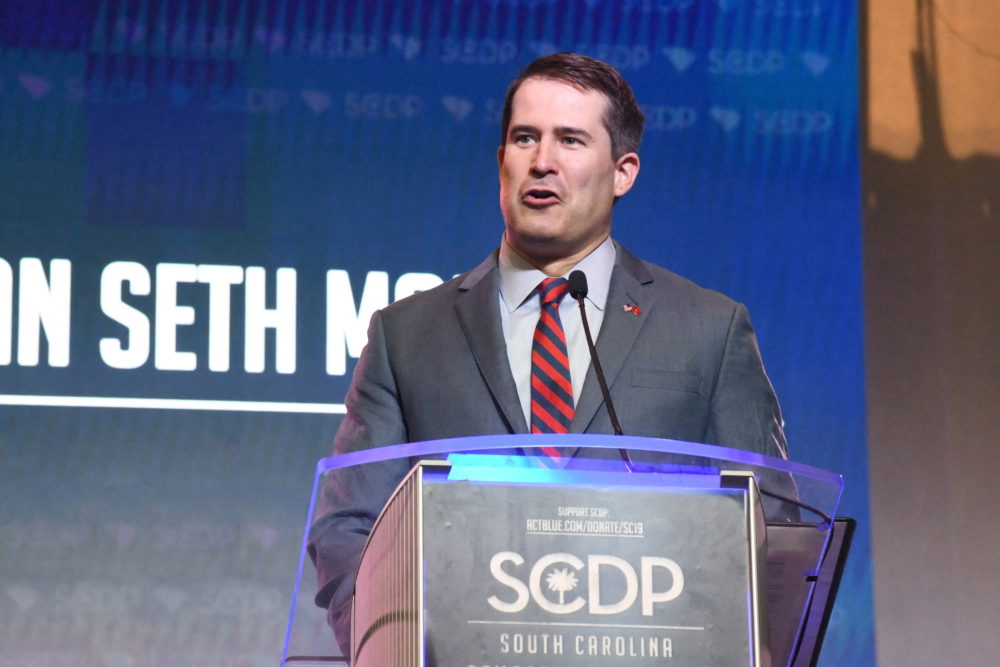Advertisement
Ambition Served Moulton Well In Combat, But Not Always In Politics

On his second combat tour in Iraq, 2nd Lt. Seth Moulton led his platoon in one of the most grueling battles of the war, at a cemetery in Najaf.
"It was intense," says Nick Henry, who served as a lance corporal under Moulton. "The thing we dealt with in the cemetery was a lot like Vietnam, almost. The insurgency would dig into the cemetery and they would pop out of little tunnels and holes. We would fight through them and then they would end up popping out of tunnels behind us, and we'd have to back up and re-clear, and basically it was 360 all the time."
Moulton served four tours of combat in Iraq. He's called it the most influential experience of his life, one he refers to often in his presidential run.
Interviews with those who served with Moulton in Iraq reveal that one quality that has sometimes gotten him in trouble in politics — his ambition — served him well in combat.
Henry says half the men in their platoon saw combat for the first time in the battle of Najaf. He says Moulton was a "very intelligent" platoon commander, sometimes "a little too intelligent," in the sense that he sometimes tried to implement tactics that were more advanced than entry-level Marines were capable of.
Still, Henry says, everything was relatively well executed. He describes Moulton as always involved, with good command and control in a chaotic situation, someone who would lead from the front most of the time, and not overly controlling.
Henry calls Moulton one of the better platoon commanders he had in five combat deployments.
"He’s very sincere with his caring," Henry says, and that came across most vitally when Moulton made sure his men were ready for combat. "He spent the time to come up with the plans and the training plan to make sure that we were prepared for anything that we came to, which is, in my personal belief, why our platoon was the most heavily relied on to execute missions during the battle of Najaf."
Advertisement
Mentors And Service
Until he was about to graduate from Harvard University, Moulton never gave any indication that he wanted to become a Marine.
"It came out of nowhere, as far as I was concerned," says his mother, Lynn Moulton, in an interview in Seth's grandparents house in Marlborough, where his parents now live. "He had some good reasons in his mind for making the choice, and they were largely inspired by his growing to know Peter Gomes at Harvard, who talked a lot about the importance of service and different ways that people could serve."

Gomes was the minister at Harvard's Memorial Church, "a man who was an enormous influence, perhaps his most important mentor in life," says David Gergen, another of Moulton’s mentors.
The Harvard professor and former political consultant remembers Moulton’s 2001 speech challenging his graduating class to find a higher purpose.
"And he gave this very, very strong address asking the question: What is the call to greatness for our generation?" Gergen recalls.
"Many of our grandparents achieved ... honor in World War II," Moulton said in the speech. "Many of our fathers and mothers stood steadfast in the midst of Vietnam, fighting their own battles of duty and protest. But what is the cause for our generation? Where is our fight?"
Two years later, Moulton was leading a platoon of Marines in the invasion of Iraq.
"The immediate thing that stood out about Seth over some other commanders was just how aware he was of how much experience he didn't have, and because of that, he was really willing to listen to senior NCOs," says Alex Lemons, one the NCOs, or non-commissioned officers, who served under Moulton in that initial drive to Baghdad.
"There were definitely some senior Marines," Lemons adds, "it was the first time they'd been around anybody from Harvard, so when they found that out, there was a little bit of kidding, but he grew on everybody."
"I think he has the good kind of ambition, the kind of ambition that sees people through crises."
Ann Gildroy Fox, who served with Moulton in the Marines
Moulton has said that he disagreed with the war early on, but every single day, he had an influence on how it was being fought.
Their platoon would be among the first American troops into the Iraqi capital.
"He didn't abuse his authority. That was pretty endearing," Lemons says, adding that serving under Moulton was a good experience in an otherwise-dissatisfying series of commanders.
After three tours, Moulton was out of the Marines. But Gen. David Petraeus asked him to re-enlist, and Moulton asked Lemons to re-enlist, too. Together they would travel all over Iraq as Petraeus' eyes and ears, identifying Iraqi forces willing to join the fight against the insurgency and Iranian infiltration.
"When something was wrong, he fought it, whether that was something that the Army was doing wrong or the Marine Corps was doing wrong, or maybe even the Iraqis were doing wrong," Lemons says. "And then he had a really strong ability to find a path through and to stay the course."
Then-Capt. Ann Gildroy Fox was the third Marine on their team.
In Al Diwaniyah, they were living in a building with no running water, in sweltering heat, under constant attack, but Fox says Moulton saw them through.
"Seth is very intense," Fox says. "He has this enormous capacity to process a lot of information at once. He's got a lot of compassion."

Eventually they secured the entire region. Fox says they couldn’t have done it without Moulton’s grit.
"He has a huge passion to be in service to other people, and he’s a very ambitious guy, but not so much so that he would step on other people to get where he needs to go," Fox says. "I think he has the good kind of ambition, the kind of ambition that sees people through crises and that allows you to make good decisions as a team."
Moulton’s four tours in Iraq transformed the young man from Marblehead.
"I think it’s made him more tolerant, in a lot of ways, and it’s certainly widened his world," Lynn Moulton says.
Moulton says her son remains devoted to the men he served with.
"Particularly, I think he’s close to that second platoon that went through Najaf," Moulton says. "It’s another family."
Fifteen years after they served together, Henry says Moulton still calls regularly to check on his men, and Henry says Moulton traveled across the country to take one of them to his drug rehab appointment.
'The Longest Of Long Shots'
Now, he’s focused his ambition on the presidency.
As measured by the Democratic National Committee, he's not doing well. The DNC has barred him from two rounds of debates because he has yet to get the required number of financial donors or standing in the polls.
"It’s the longest of long shots," says Gergen, who believes Moulton has alienated some on the left, ironically because last year, he campaigned successfully to get young Democratic veterans elected to Congress, an effort Gergen says contributed to the Democrats taking back the House of Representatives.
"The people who won were taking back districts that [President] Trump had won in many cases," he says, "and so naturally, they have to be more mainstream than some of the progressives in the Democratic Party, and that makes Seth a target for some of the progressives, saying he’s too mainstream, he’s too close to the center."
"I think he stumbled to a degree over the Nancy Pelosi effort."
David Gergen
Gergen says Moulton also set himself back by opposing Nancy Pelosi’s re-election as speaker of the House.
"I think he stumbled to a degree over the Nancy Pelosi effort," Gergen says. "I think it was not fully understood what he was trying to do. He wasn’t going after Pelosi directly so much as saying there are several people at the top here, and there ought to be at least one seat for the younger folks who are coming up. He did get that eventually, but he did pay a price for it."
Some Democrats called Moulton — who also faces two primary challengers for his North Shore congressional seat — a sexist for opposing Pelosi. That bothers Fox.
"I was a female Marine, and I never once felt like Seth didn’t value my input or opinion," Fox says. "I never felt categorized by him. I always felt very supported by him. So as it relates to female service members, I had a really great experience with him. He just never saw anything through a gender lens."
Three months now into Moulton’s "longest-of-long-shot" presidential campaign, Fox recalls another trait Moulton displayed in Iraq that could come in handy.
"He just will stay the course when others give up," Fox says.
This segment aired on July 26, 2019.
